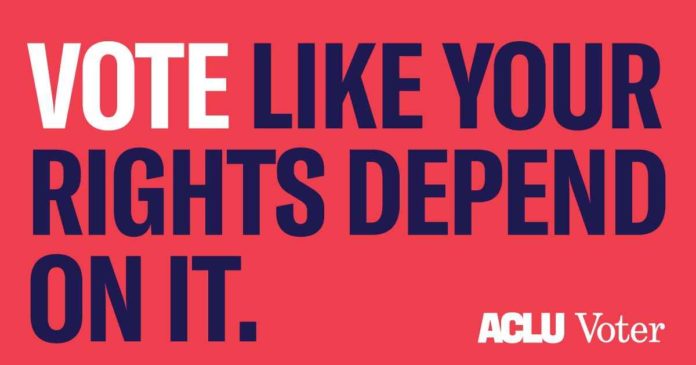Here we are, a little more than halfway through the year, and we’re already knee-deep in the 2020 presidential election and the race for the White House in what will surely be one of the most controversial, heated and fascinating elections in history.
The pool of candidates is crowded, to say the least. There are currently 26 candidates seeking the presidency, including our current Commander-in-chief, one opposing Republican candidate and 24 Democrats. And even still more candidates are coming out of the woodwork and announcing their run even after claiming they were not going to throw their name in the hat (we’re looking at you Tom Steyer). At a time when it feels like the pool of candidates should be shrinking, we’re still trying to keep track of all the potential Presidential candidates.
Yes, it’s a lot of people to read up on and a lot of information to wrap our heads around. But what that really means is that in these early phases of polls, debates, campaign trails, and policy promises, we have a lot of choices. And we have a lot of power. Our power lies in our vote, and there is no excuse not to get educated so that we can make our voices heard and can impact the future of this country in a way that may change the political landscape and soul of our nation forever. There is a need to be informed. There is a need to focus on the important information, policies, stances, and experience of each candidate and not get wrapped up in the drama.
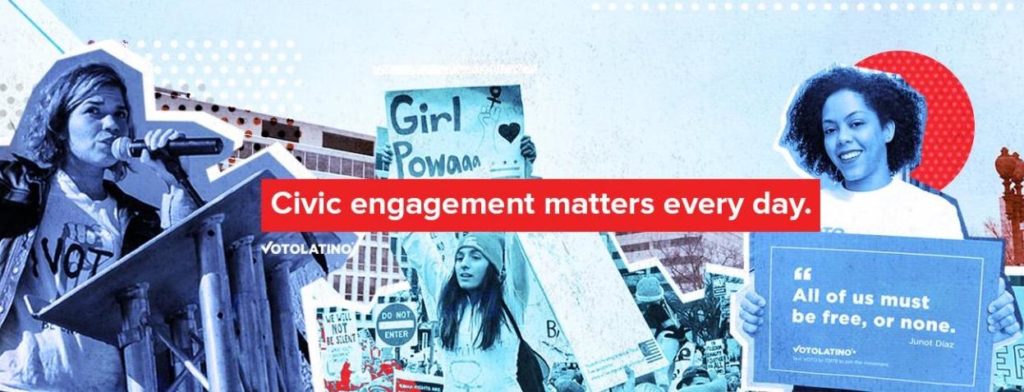
In this upcoming election, all eyes are on Trump, and whether or not he can win re-election. But people are watching the Democrats even more closely to see who they will nominate to take on Trump in an attempt to win back the White House and all that comes with it. Whatever happens in 2020 is going to be a real game-changer, which is why we’ve created a guide to help you stay in-the-know and master the art of choosing for change.
Think of this as your 2020 Election Cheat Sheet. It’s like Cliffs Notes for voting. The countdown to November 3, 2020 is officially on, and it’s time to get schooled on the policies, facts, and candidates that really matter to you. Because there is no reason not to be informed and there is definitely no excuse not to vote.
The Important Election Dates You Need to Know
Voter Registration
Voter registration varies from state to state, so check your local requirements in terms of deadlines to register to vote in both the primaries and the presidential election. Generally speaking, most states allow voters to register up to a few weeks prior to Election Day, and in some states voters can even register to vote same-day in person.
Primary Debates
Democrats will hold 12 primary debates, including six in 2019. The first Democratic debate took place in Miami on June 26-27. The next debate will take place in Detroit on July 30-31, and then there will be four more debates this year, one per month, from September through December. Even though President Trump already has one announced opponent, he has not yet confirmed any Republican debates.
Primary Elections and Caucuses
The Iowa Caucus kicks off the primary season and takes place on February 3, 2020. Next up are the New Hampshire primaries on February 11th and then the South Carolina Republican primary on February 15th and the Nevada Democratic caucuses on February 22nd. Primaries and caucuses continue in states across the country through June 2020, as we gear up for the conventions and ultimately Election Day.
PS – If you’re confused about the difference between a caucus and a primary, the short explanation is that a caucus is a meeting of supporters of a specific political party who gather to elect delegates to choose whom they believe should be the candidate in a given election. A primary is an organized statewide event put on by the state government where voters cast a secret ballot for the candidate of their choosing in order to select the candidate running for that political party.
Convention Dates and Locations
The Republican National Convention and the Democratic National Convention officially mark an end to the primary season and confirm each party’s candidate for president and vice president. This is also an opportunity for each party to finalize their platform and unify their party leading up to the general election.
July 13-16, 2020 – Democratic National Convention
Held in Milwaukee, Wisconsin, a key Midwestern battleground state
August 24-27, 2020 – Republican National Convention
Held in Charlotte, North Carolina
Early Voting and Election Day
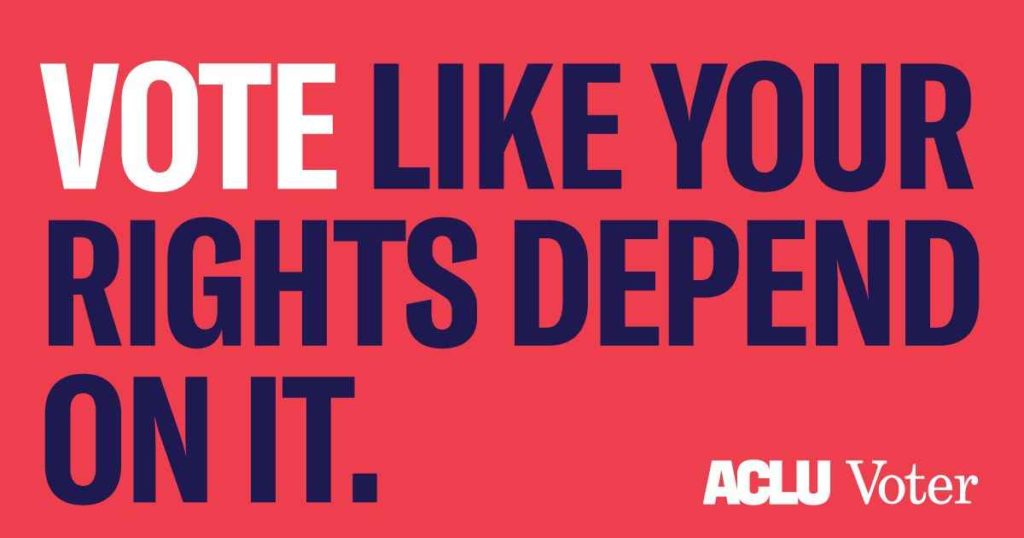
Election day is November 3rd, 2020, but as many of us know, early voting and absentee ballot voting begins long before then. For some, the option to vote by mail or to participate in early voting might make the most sense (if you travel a lot, you’re in between residences, you’re worried you won’t be able to take off work, you won’t have childcare etc.) For others, part of the thrill of the democratic voting process is to physically submit your ballot on Election Day. It’s important to know that you have options. Various states allow early or absentee voting, and the statutory requirements relating to the start and end of in-person early voting and by-mail elections vary by state. Check with your local elections office to find out the policies in your district. Regardless of when or how you vote, the most important thing to remember is that your vote counts, and there really is no excuse not to make your voice heard.
Vote at Home, for example, is the national organization dedicated to improving access to mailed-out ballots, and as such wanted you to be aware of some resources you might useful in future coverage. Their research outlines for every state how and when people can sign up for mailed-out ballots, with the relevant links to each state’s web site. You will find it at. For a quick overview of the mailed-out ballot situation nationally, check out their one-pager. And here, you can check out the latest media coverage. If you want to go really deep, read (or even skim) their Policy & Research Guide. You’ll know more than about anyone in the country on this subject!
Key Issues to Watch
Before we get to the candidates – and reminder, there are a LOT of them – let’s talk about the issues. There are several key topics that will come up time and again on campaign trails, in speeches, debates, party platforms, reform plans and more. Some very crucial and key issues to keep an eye on:
Gun Control: The debate over gun control and the 2nd amendment are not new to politics; in fact they have played a role in presidential elections and government for decades. But the recent surge in mass shootings and the devastating instances of gun violence across the country has brought the issue to the spotlight even more so for 2020. Democrats are calling for gun control reform (aka more strict regulations over who can gain access to a gun, more thorough background checks for gun purchasers, and a ban on assault weapons). On the flip side many Republicans, including President Trump, defend gun rights and support the National Rifle Association. In a speech to the NRA supporters earlier this year Trump said “gun owners make our communities safer and they make our nation stronger.”
Women’s Rights: Whether or not the government has any right to determine what a woman does to her body has been front and center in recent months, especially as a wave of anti-abortion policies and laws that prevent doctors from performing abortions are being enforced in states across the country. Considering how under attack women’s rights are, and how important the female vote is for presidential hopefuls, it makes sense that candidates are not being shy about their take on women’s rights. Expect to hear a lot about equal pay, abortion rights, women’s healthcare, reproductive rights, and maternal leave.
Immigration and Border Security: The crisis at our border is heartbreaking and unjust. Families are being torn apart, thousands of migrants are being held against their will under unlivable and undignified conditions, and children are dying in federal custody. This injustice has to stop. That’s one thing that most candidates and even our current administration can agree upon — the immigration plan that is currently in place is not working. What they don’t agree on is how to fix it. Trump notoriously has had a hardline policy on immigration. He wants to build his freaking wall across the southern border between the US and Mexico to keep out the “criminals and rapists” and he has ordered mass deportations and ICE raids in states across the country. Democrats are all fairly in sync about wanting to create a path to citizenship for the millions of undocumented immigrants now living in the US. Their plans all differ in terms of logistics, but their goals are consistent; undo Trump’s policies, implement comprehensive immigration reform, protect young immigrants and do away with the law that makes crossing the border illegally a criminal offense (rather than civil), just to start.
The Economy: If you ask President Trump, our economy is on fire. Our country is experiencing steady GDP growth and a record 50-year low for unemployment. Trump claims it’s because of his tax plan and his efforts to increase US jobs by keeping businesses domestic and getting out of trade partnerships that didn’t serve our country. Democrats say the wealth isn’t being distributed evenly for all Americans and that it only benefits the top 1 percent (read: extremely wealthy). Economic inequality is a big talking point for Dems, and they all have their plans for how to lift up the middle class, help low-income workers and close the wealth gap in our country.
Healthcare: We’ve been hearing about The Affordable Care Act (aka Obamacare) since, well, Obama was in office. Republicans hate it. Trump has been trying to get rid of it since before he stepped foot in the oval office. Some Democrats support it, some think it’s flawed, but generally speaking, they all want to ensure that health care is not a privilege but a right granted to all Americans. They want to make healthcare more accessible, more affordable, and many Democratic candidates support Medicare for All.
The Climate Crisis: It’s hard to ignore climate change; after all, we’re seeing the devastating effects of the changes to our environment and global warming in real-time, from hurricanes to floods, wildfires, rising sea levels and fierce storms striking all over the country and the world. During his presidential campaign, Trump claimed that climate change is a hoax crafted by the Chinese, and he announced plans to pull the US out of global efforts to combat the climate crisis and reduce greenhouse gas emissions. His administration also announced plans to end the Clean Power Plan, a plan to curb carbon emissions and promote state use of renewable energy. Perhaps most frightening, Trump has dismissed scientific findings on the dangers of climate change and its potential impact on the future of our planet. Democrats are taking the opposite stance and are on a mission to promote renewable energy and reduce carbon emissions drastically, even setting a goal of reaching net-zero carbon emissions nationally by 2050.
Of course, there are many (many) other important issues, from national security to criminal justice reform, to trade and taxes. Our best advice: hone in on the issues that are most important to you and your family, and listen to what every candidate has to say on the matter. Do your research, and find a candidate who speaks to you and speaks for you, whose opinions, goals and plans are aligned with your own, and then vote accordingly.
Why this Election Matters More than Ever
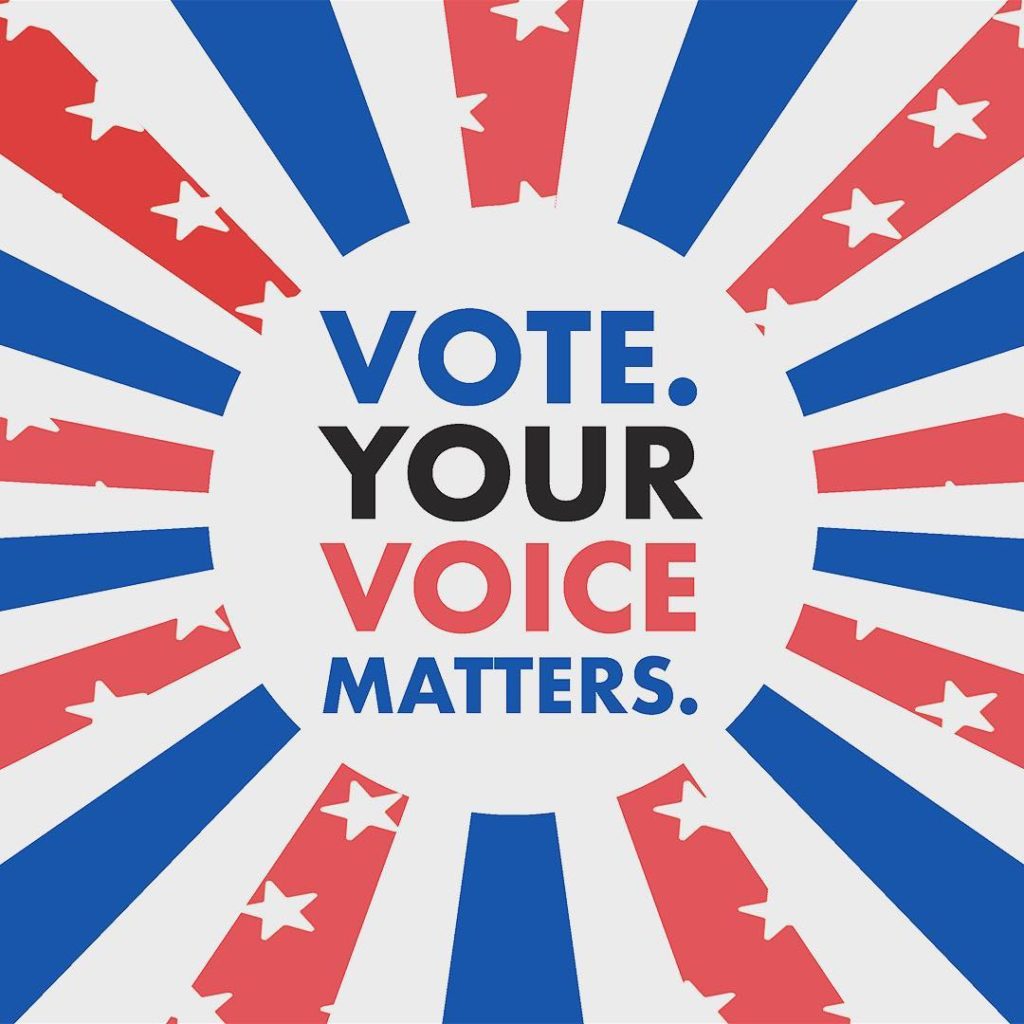
Every election matters, whether we’re talking about local government or a presidential election. But the 2020 presidential election will impact our country and our world in potentially monumental ways. And every vote matters. In 2016 Donald Trump won the presidential election, winning the Electoral College with 304 votes compared to 227 votes for Hillary Clinton. But he lost the popular vote, earning 62,985,106 votes (45%) compared to Clinton’s 65,853,625 (48%). On top of that fact, reports show that about 30% of Americans who were eligible to vote decided not to in 2016. And based on the January 2019 analysis from the Pew Research Center, there are now more than 224 million people of voting age in the US, and they are more diverse than ever. Non-white voters will account for a third of eligible voters and one in 10 eligible voters will be of Generation Z (between ages 18 and 23).
In addition, the analysis projects that “the 2020 election will mark the first time that Hispanics will be the largest racial or ethnic minority group in the electorate, accounting for just over 13% of eligible voters – slightly more than blacks.” In case you were curious, that equates to about 32 million Hispanic voters.
Bottom line: the game is about to change in the upcoming election, and more than ever it’s crucial that everyone get educated and get out and vote.
The Candidates to Watch
Let’s move on to the candidates. Again, there are many of them. While there is only one Republican candidate who has tossed his name in the ring to go up against Trump, there are more than 20 democrats hoping to earn the Democratic nomination. And perhaps most impressive and exciting, there are now more women running for a single party’s presidential nomination than ever before.
We’re not going to go into detail on all of them, but let’s talk about the front-runners and the ones to watch.
Republican Presidential Candidates
President Donald J. Trump
Trump has been trying to make America great again since he was sworn into office in 2017, and now he’s reapplying for the job, on a mission to reduce illegal immigration and build the border wall he’s been talking about for years. He’s still promising to lower corporate taxes, end trade deficits and create more jobs in America. He still wants to do undo Obamacare and he’s still trying to become besties with Kim Jong Un. He has announced that the US will withdraw from the Paris climate accord, an agreement intended to reduce global greenhouse gas emissions for nations across the globe, and that withdrawal would be complete should he win re-election in 2020. He’s also vocally anti-abortion, anti-women’s rights and he implemented a ban on transgender people serving in the military. Time and time again, he has made racist remarks, questionable comments against minorities, women, people with disabilities and more. As recently as last week Trump spoke out against four congresswomen of color, saying they should “go back” to countries they came from, despite the fact that three of those four women were born in the US, and they are all American citizens.
With his polarizing politics and his often offensive, racist and arguably unstable approach to the presidency, it’s safe to say you either love him or hate him. But it’s also safe to say he’ll be around for the 2020 elections as the Republican candidate — the last time a president didn’t get re-elected was in 1992. Plus, Trump is already focusing on his 2020 campaign by hiring more than 30 full-time staffers as a part of a corporate-style reelection campaign with 10 divisions reporting to a single senior adviser.
Bill Weld
The only contender for the Republican nomination is Weld, a former governor from Massachusetts, who is positioning himself as the anti-Trump Republican. He ran for vice president as a Libertarian in 2016, and while he supports several traditionally republican views, he also supports abortion rights, gay rights, marijuana legalization, and cutting taxes.
Democratic Presidential Candidates
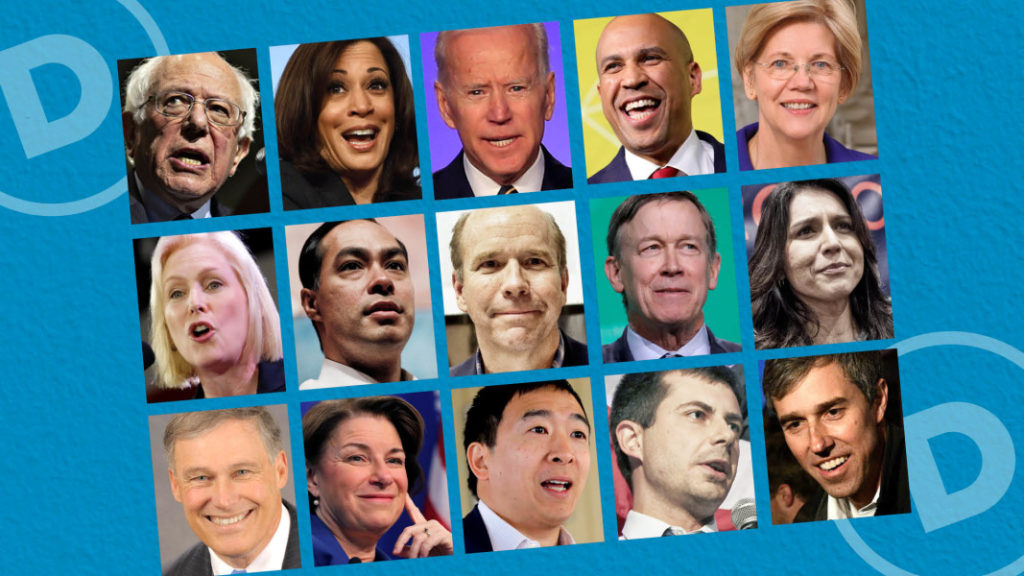
Joe Biden
We all remember Biden as the VP under President Barack Obama for two terms, and many of us fell in love with both their bromance and his politics. Biden has been in the political world for a long time as Delaware’s longest-serving senator and more recently the Vice President. He’s running for president because he believes that Trump is a “threat to this nation,” as he explains in his announcement video, and he is seen as a popular moderate. So far he also seems to be the Democratic front-runner. A recent poll out of South Carolina shows Joe Biden is leading with Democratic primary voters by 21 points and another NBC/Wall Street Journal poll shows that Biden currently leads Trump by 9 points.
Kamala Harris
The former California Attorney General and current California senator is heating up and gaining a lot of support in the race for the Democratic nomination after an impressive performance at the first Democratic presidential debate. Should she win the nomination she would be the first African-American woman to be a major party’s nominee for president ever. She is a strong critic of the Trump administration and is trying to appeal to progressive activists while offering moderate policies. She believes in a universal right to healthcare, working to combat climate change, and has a plan to lift up the middle class by offering tax credits to lower-income households. In recent polls Harris’ numbers are on the rise after a strong showing on the second night of the debates. According to CNN, among those who watched or followed news coverage about the debates, 41% say Harris did the best job.
Elizabeth Warren
The democratic senator from Massachusetts was the first major candidate to enter the race and announced her run for president several months ago. She’s a longtime critic of Trump and has been outspoken about her disapproval of his administration’s policies and wants to end government corruption. Warren played a big role in creating the Consumer Financial Protection Bureau and wants to regular Wall Street. She’s running on a platform of universal childcare, affordable healthcare, and a tax on the ultra-wealthy. There has been some controversy around her ancestry — she identifies as a minority and has Native American ancestry that dates back several generations — but she’s focusing on empowering voters and providing comprehensive plans and policies to achieve her goals.
Bernie Sanders
Senator Bernie Sanders from Vermont really wants to be president, so he’s running for the Democratic nomination (again). You might remember him from 2016, when he lost to Hillary Clinton in the primaries. He’s a self-described democratic socialist and he is the longest-serving independent member of Congress in history. He still wants Medicare for All, increased minimum wage and increased taxes on the wealthy. He co-sponsored the Green New Deal resolution with a goal of achieving net-zero global emissions by 2050, and he wants to make four-year public college tuition-free. While many of his policies have also been adopted by other candidates, he is currently polling well, trailing just behind Biden, Harris, and Warren.
Pete Buttigieg
This military veteran and current Mayor of South Bend, Indiana would be the youngest president ever at just 37 years old if he is elected in 2020. He would also be the first openly gay presidential nominee for a major party if he earns the nomination. He’s a Harvard graduate, a Rhodes Scholar, and a Millennial, so he’s playing the generational card and expressing his long-term investment in this country and the need for change. He supports Medicare for all who want it, he supports women’s rights, wants immigration reform that protects the rights of all (including immigrants) and he wants to provide a path to citizenship. He’s currently ranked 5th in the polls at 4 percent, but he also recently raised nearly $25 million (!) in the 2nd quarter of the year, making him the fundraising leader of the democratic nominees for this quarter.
Beto O’Rourke
This former congressman from El Paso, Texas gained a lot of attention when he went up against (and lost to) incumbent Ted Cruz for Texas’ open senate seat in the 2018 midterm elections. He has always been very outspoken about his views on immigration and has vocally opposed the border wall. He wants to invest in clean energy to combat climate change, and while he owns guns he wants to enforce stricter gun laws including universal background checks and a ban on assault weapons. Recent polls show him tied with Booker for 6th in the polls.
Cory Booker
The New Jersey Senator was previously elected as Newark, NJ’s youngest city council member prior to his gig as a senator. During his time in the Senate, he’s focused a lot on criminal justice reform and now he’s throwing his hat in the race as a democratic candidate. He supports a federal jobs guarantee, Medicare for All, combating the affordable housing crisis, and he’s introduced a bill that would basically create a federally-funded savings account for all US-born children (read baby bonds). Expect his campaign to focus on unifying the country and creating a country where no one feels left behind.
Other Democratic Candidates to Watch:
Amy Klobuchar, Julián Castro, Kirsten Gillibrand, John Delaney, Tulsi Gabbard, Marianne Williamson, Andrew Yang, Jay Inslee, John Hickenlooper, Wayne Messam, Tim Ryan, Seth Moulton, Michael Bennet, Steve Bullock, Bill de Blasio, Joe Sestak, and Tom Steyer.
For Image credit or remove please email for immediate removal - info@belatina.com


























